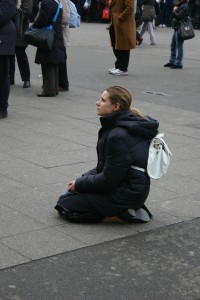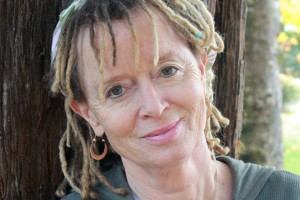My gracious, but it’s been awhile since I posted something on this blog. I have a good excuse, as I’ve been traveling in a place that has quite a few holy sites to explore: Israel. As you can imagine, I gathered some rich material for writing.
While I recover from jet lag and plow through some other projects, my husband Bob is going to take over the posting duties for the next few days (more on that tomorrow). He’s working on a new project that I think you’ll find interesting.
For today, I want to post an essay of mine on prayer that appeared on the Episcopal News Service. It includes references to a few earlier ruminations, so you may recognize parts of it.
Prayer From the Inside and the Outside
As Christians we practice prayer, we talk about prayer, and (if we’re ordained) we preach about prayer. But this past fall I got the chance to learn about prayer from a different perspective while writing a magazine article about the physical and psychological effects of this age-old spiritual practice.
While doing research for the article, I interviewed several of the nation’s top researchers in the field of spirituality and health. They told me that more than 4000 studies have been done on the ways our religious beliefs and practices affect our physical and mental well-being. They talked about prayer as it relates to the mind-body connection, described what brain scans show when people are meditating, outlined the challenges of conducting double-blind studies of intercessory prayer, and speculated about the physical mechanisms that may be at work in prayer.
I came away with considerable respect for the dedication of these researchers. But I was also struck by something one of these scientists said, a man who has spent his professional life researching the physical effects of prayer. “I study prayer, but I also practice prayer,” he added at the end of our interview, unprompted by any question from me. “I think the science is important, but I’m not going to base my religious practice on whether the latest double-blind trial finds something. The ability to connect with God, to connect with the eternal and holy, is a precious resource that we all have. That’s why I pray, not because science proves that it’s good for me.”
I found it reassuring that even a top-notch research scientist recognizes the limits of his work. But his comment got me thinking about other experts on prayer: those who have actually experienced its power.

I think, for example, of my friend Teri, who recently spoke at our church as part of an adult forum series on prayer. She talked of how she had been somewhat of a skeptic about prayer, despite having grown up in a devout family and having been an on-and-off member of a church herself for years. But when she was diagnosed with cancer last year, her extended family organized a healing service for her in the Roman Catholic parish in which she’d grown up. In came her aunts, uncles, cousins, second cousins twice removed, old teachers, school buddies, old neighbors, friends of her brothers and sister and their in-laws, and a bunch of people she’d never met before who came because they were part of a faith community and knew that someone was suffering and needed their help.
In the middle of the service, the members of the congregation came forward and placed their hands on Teri’s head, shoulders, arms and back as they prayed, and she said she felt a kind of vibration or current flowing through her.
Teri used a metaphor to describe what that experience was like, one that I’ve never heard used in conjunction with prayer. She said that she felt like she was a kite being lifted up into the sky by a string of prayers and that their collective energy was guiding her in flight.
“That feeling still resonates with me even now, eight months later,” she said. “I haven’t been the same since. It’s not that I don’t get scared or grumpy or weepy at times, but I have a feeling or a knowing that the Holy Spirit is present. Some kind of energetic shift has occurred that has knocked me out of my head and into my heart.”
And then she quoted a line from Rumi, the fourteenth-century Sufi poet who knew better than almost anyone the power of the Spirit:
All of my life I’ve been knocking at the door, and when it finally opened, I realized that I was knocking from the inside.
When we look for experts on prayer, we shouldn’t discount the contributions of scientists. But truly, the great masters of prayer are those who have felt its power from the inside.











